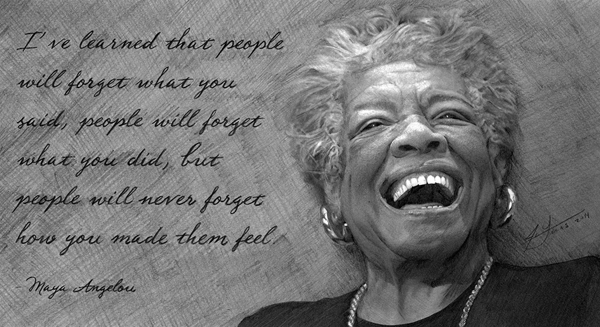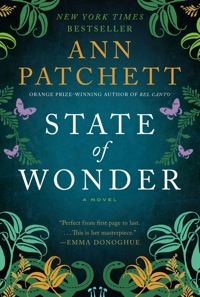Mister Owita’s Guide to Gardening by Carol Wall
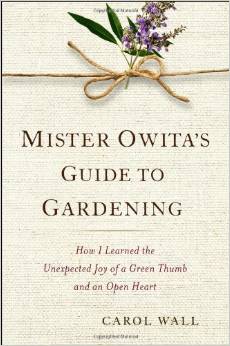 The subtitle, How I learned the Unexpected Joy of a Green Thumb and an Open Heart, struck a instant cord…I’m a sucker for gardening books – especially those wherein a garden is transformed. (I secretly wish to be Vita Sackville-West.) So this memoir seemed just for me.
The subtitle, How I learned the Unexpected Joy of a Green Thumb and an Open Heart, struck a instant cord…I’m a sucker for gardening books – especially those wherein a garden is transformed. (I secretly wish to be Vita Sackville-West.) So this memoir seemed just for me.
Turns out Mister Owita’s Guide to Gardening is not so much about gardening as friendship, cancer, life-lessons, and humanity.
Carol Wall forms a friendship with a local gardener, Mr. Owita, hoping he can transform her garden. She is a difficult client and Mr. Owita does what he thinks is best for her garden ignoring her wish to have all the azaleas removed and giving her his bits of wisdom on gardens and life.
As the days progress, Ms. Wall’s cancer returns, she forms a closer friendship with Mr. Owita and learns more about his background. He’s from Kenya and actually has a PhD in horticulture, but is unable to get a university posting and is forced to work several minimum wage jobs. He has a daughter he had to leave behind and is working hard to save enough to bring her over to the US.
Ms. Wall’s troubles feel lighter and she becomes less self-involved, as she learns more and more about Mr. O’s burdens. At the beginning of the book she is whiny and very self involved – but then again, she is suffering greatly from a re-bout of cancer – so I didn’t find it too off-putting.
I did drink in this memoir filled with satisfying insights and reflections. Ms. Wall has a lovely writing style – just perfect for the story told. I found myself liking Carol Wall –she is far from perfect and is not afraid to display her missteps, foibles, and narcissist tendencies.
A really nice plot point about why she didn’t want azaleas or color in her garden left me sighing with pleasure…while an undeservedly nasty letter to her husband left me shaking my head. Mr. Owita’s challenges seemed more interesting than hers, his character fascinatingly wise and I wished there was more development of his character.
Ms. Wall has a right to tell her story in her way and I will not criticize a book for NOT being what I thought it would be. This is a lovely memoir about living with cancer (warning, cancer looms large), finding friendship, the joy of a garden (as opposed to actual gardening) and life lessons learned from someone who is suffering their own silent burdens and tragedies.
Review copy provided by Putnam Group via NetGalley.
The Hundred-Foot Journey by Richard C. Morais
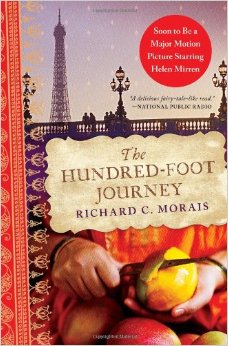 The film is coming – the film is coming. So I grabbed this book off my shelves where it has been ignored for several years now. As always, I want to read the book before seeing the film (with Helen Mirren – oh boy).
The film is coming – the film is coming. So I grabbed this book off my shelves where it has been ignored for several years now. As always, I want to read the book before seeing the film (with Helen Mirren – oh boy).
I bought this paperback several years ago, solely based on the cover, call me shallow, but isn’t it delicious? See the gold embossing up the edge of the spine?…sigh. My copy doesn’t have the red circle announcing the film.
Anyway, now to the book. The Hundred Foot Journey tells the story of an Indian boy, Hassan Haji, whose family is forced to move from Mumbai, to England and finally to Lumiere, a small village in the French Alps.
They purchase a large country house and because Papa Haji is a entrepreneur and the aunt excels at Indian cuisine, they blithely open an Indian restaurant. Just across the street is the Michelin starred restaurant of famous French chef, Madame Mallory. As expected the cultures and cuisines clash, an Indian restaurant in the French countryside – mon dieu! The main storyline follows the coming of age and the making of famous chef – young Hassan.
I found the book interesting and often captivating, but many aspects fell short for me. The glimpses into the various cultures and their cuisine were superb – Mr. Morais obviously knows and loves food. The descriptions of meals served and eaten are cinematic (thus the film adaptation). The kitchen scenes felt very realistic, but be warned some of the meat slaughter and preparation scenes will have you contemplating vegetarianism.
The narrative fluctuates from first person to third person which I found a bit jarring and the pacing is a bit sporadic. The book glossed over any real hurdles immigrant families might face – language, assimilation and what about the endless paperwork?
In the end, however, the food is the only thing that comes alive in this novel. I found the characters lacking warmth or depth and some are an actual mockery – Papa Haji has a manufactured Indian dialect that I found condescending. A relationship between Hassan and Margaret lacks any warmth or passion. Hassan, robot-like, ascends the heights of his star chef status, without enthusiasm. Madame Mallory is the most developed character, as Mr. Morais gives us insight into her past and emotions. She is the one who singles Hassan out for greatness: ”That skinny Indian teenager has that mysterious something that comes along once a generation. He is one of those rare chefs who is simply born. He is an artist.”
So why did I finish this book? – THE FOOD – read this book for the vivid and mouthwatering descriptions of hot, frenetic kitchens, food lovingly prepared, wines carefully chosen and meals savored.
The real heart and soul of this book is the joy of cuisine.
Hoping to see the film soon.
The Goldfinch by Donna Tartt
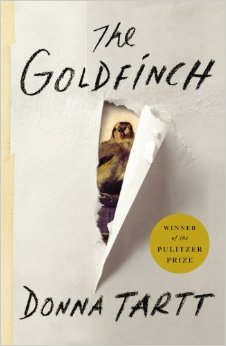 This is the first book I purchased for my new Kindle (yes I’ve gone to the dark side – but I have room in my life for many reading methods). The Goldfinch is over 700 pages and the hardback was almost $30 – while the Kindle version was $8. Done! I could not wait to read this.
This is the first book I purchased for my new Kindle (yes I’ve gone to the dark side – but I have room in my life for many reading methods). The Goldfinch is over 700 pages and the hardback was almost $30 – while the Kindle version was $8. Done! I could not wait to read this.
Ms. Tartt is a precise and careful writer –her last book was 10 years ago, and her prior book 10 years before that, so I knew this would be well-written with a tautly crafted plot. But at 771 pages I wondered how tight the storyline would be.
Well it turns out The Goldfinch has several story lines – it’s almost as if there are three books in this one novel. But in her usual fashion Ms. Tartt keeps these narratives racing along without excess.
One of the reviews noted The Goldfinch was a Dickensian Bildungsroman , and yes, I had to look that word up.
Here you go — no charge:
In literary criticism, a Bildungsroman, [a] novel of formation, novel of education, or coming-of-age story is a literary genre that focuses on the psychological and moral growth of the protagonist from youth to adulthood, and in which, therefore, character change is extremely important.
At the risk of being hackneyed, I could not put this book down. I reluctantly went to sleep worried about the main character, Theo Dekker, as he moved from one miserable situation to a life threatening crises, to a hopeful place.
The detailed writing style requires a tenacious attention span but I was fully enthralled throughout the novel. There are beautifully crafted scenes, vivid descriptions, wonderful characters – heartbreak, love and joy.
There are plenty of professional reviews out there, go and read them and then please read this Pulitzer prize worthy novel.
(Edited later – The Goldfinch ultimately and deservedly did win the Pulitzer.)
Letters from Skye by Jessica Brockmole
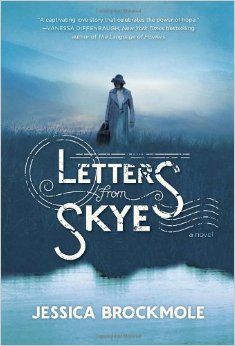 Best to state this upfront, I’m a total sucker for epistolary novels, so I eagerly opened this novel on a weeknight with lots scheduled for the next few days. Silly me, no early bed times for me for the next couple of nights. And yes, I read this engaging novel in two evenings.
Best to state this upfront, I’m a total sucker for epistolary novels, so I eagerly opened this novel on a weeknight with lots scheduled for the next few days. Silly me, no early bed times for me for the next couple of nights. And yes, I read this engaging novel in two evenings.
It’s 1912 and Elspeth, an isolated poet on the Isle of Skye, receives a fan letter from a young American, Davey, as he is about to start college. Thus begins a 5-year correspondence that starts as a friendship and grows into a love affair. The story spans two wars, and is intertwined with Elspeth’s daughter’s (Margaret) letters as she struggles to unravel the mystery of her mother’s early years, this correspondence (affair) with Davey and ultimately, the family breaking apart.
The story is told entirely via letters, which is a very difficult format to pull off. Many such novels can border on the gimmicky…but not Letters from Skye. Ms. Brockmole deftly builds her characters, giving them depth, layers and feelings. With each letter, the story, the characters and their strong bond are slowly revealed.
I had to remind myself that this was fiction, that these weren’t real letters or real people. The letters also are able to convey the beautiful ruggedness of the Isle of Skye and the war-torn Edinburgh.
Importantly this book made acutely aware of the lost art of letter writing — where the letter-writer captures the day’s weather, mundane bits of daily life and bare their secret feelings and dreams on good old-fashioned paper. Letters that were eagerly awaited, opened and treasured. Not like today’s temporary emails, text messages, tweets and Facebook postings. Our correspondences are no longer treasured – what will we have to re-open, re-read, re-live?
It is obvious that the author did a great deal of research, so it’s a shame that some of the letters didn’t ring true with some of the language a bit “off” for the time period — but that’s a minor quibble.
An enchanting book with characters that work their way into your heart.
I almost never do this anymore, but I’m keeping my ARC copy to re-read.
A quote from the book: “I should have told you, should’ve taught you to steel your heart. Taught you that a letter isn’t always just a letter. Words on the page can drench the soul…”
Advanced reading copy provided by Random House, Ballantine Books.
Lake Tahoe Hiking
Just returned from a week up in Lake Tahoe.
Did some nice hikes, and as you can see, we caught the Aspens just at their peak of color.
Woke early one morning to a light dusting of snow…which melted by the time we finished breakfast.
In our opinion, Lake Tahoe is at its best in the fall after all the summer visitors have left.
Very quiet and we often had the trails all to ourselves. (Click photos to view larger.)

State of Wonder by Anne Patchett
The news of Anders Eckman’s death came by way of an Aerogram, a piece of bright blue airmail paper that served as both the stationary and when folded over and sealed along the edges, the envelope. The single sheet had traveled from Brazil to Minnesota to mark the passing of a man – a breath of tissue so insubstantial that only the stamp seemed to anchor it to this world.
I read that opening line with my mouth hanging open at the beauty of the writing. Full disclosure, I’m a Anne Patchett fan – Magician’s Assistant is one of my all time favorite novels…as is Bel Canto. So after that opening sentence, I was mentally cancelling all plans for the next few days so I could loose myself in this book.
Marina is a drug scientist who is sent to Brazil find out what happened to her dead colleague. She is set down in the middle of the Amazon jungle and immediately faces unforeseen challenges at every turn. The dramatic storyline takes many twists and turns. She discovers an experiment taking place among the native women, wherein they chew a native tree bark while it’s still on the tree (really?) and this bark extends their fertility well into their senior years (just say no!).
Marina finds dishonesty and false claims among the drug reports back to headquarters. The tribal people themselves hold secrets. She finds love (of sorts) and suffers from long drawn out, vivid dreams as a result of Malaria medication. The dreams tended to bog down the flow of the story and I must say I kept hoping Marina wouldn’t fall asleep again so I didn’t have to read through another one of her tangled dreams.
I agree with other reviewers that the jungle itself plays a major character. The vivid descriptions of the heat, humidity, insects, dirt, and torrential rains gripped me into believing I was there. The story line under another author’s hand might seem incredulous, but as always Ms. Patchett allows you to suspend disbelief and journey with the characters. I even believed it when they accidentally canoed down the wrong small river tributary and discover … well I won’t spoil it for you.
Bravos to Anne Patchett once again – a must-read adult adventure story, reminiscent of reading with a flashlight under the covers – too wrapped up in the story to go to sleep
Two of my favorite quotes (in addition to that grand opening line):
“The question is whether or not you choose to disturb the world around you, or if you choose to let it go on as if you had never arrived. That is how one respects indigenous people. If you pay any attention at all you’ll realize that you could never convert them to your way of life anyway. They are an intractable race. Any progress you advance to them will be undone before your back is turned. You might as well come down here to unbend the river. The point, then, is to observe the life they themselves have put in place and learn from it.”
“But we cannot un-braid the story of another person’s life and take out all the parts that don’t suit our purposes and put forth only the ones that do.”


